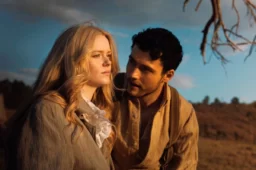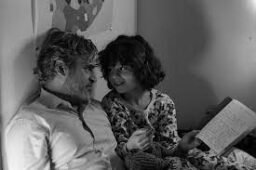
REVIEW: The Last Jedi (Star Wars, Episode VIII)
- December 18, 2017
- by
- Ivan Moore
“You underestimate the power of the dark side,” says Darth Vader to his son and desired apprentice Luke Skywalker. It’s one of those Star Wars lines that sticks with you. The line is meant to strike fear in young Skywalker, but it puts on display one of the major themes of the saga and one that is so beautifully at the center in the newest installment, The Last Jedi. In an expansive galaxy like that of Star Wars, with expert pilots, exotic alien creatures, and supernatural warrior priests, who has the most power? What does true power look like?
The easy answer for many long-time fans would be “The Force.” After all, according to Obi Wan Kenobi, The Force is “an energy field created by all living things. It surrounds us and penetrates us; it binds the galaxy together.” The genius of The Last Jedi is that it, not only calls into question what we know about The Force, but shows us that it is not the be-all-end-all of power in the galaxy. The ancient war that has been waging for decades across the saga, framed by a simple conflict between light and dark, just isn’t that simple after all. Which is a lesson Luke Skywalker, the legendary hero of the original trilogy, has had to learn the hard way.
What the new movies have done so well is thematically and narratively explore the lives of the old cast through the eyes of the new. 2015’s The Force Awakens did this through Han. Han Solo has always been the ultimate lone wolf, on the run from one thing or another. In Episode VII, we meet Finn and Rey, two people at a point in their lives where they are ready to escape and Han is the perfect spiritual guide. Throughout the movie Rey, ready for a father figure, bonds with Han and with his ship, the Millennium Falcon, which has been the ultimate getaway car throughout Star Wars cannon. Finn escapes his life as a Stormtrooper and is confronted with a decision to keep running or be a part of something bigger. There are so many parallels to what we know of Han’s story in both Finn and Rey. The Force Awakens was very much Han’s chapter. In the same way, The Last Jedi is Luke’s.
Even in the final moments of Episode VII, there is a literal hand-off of the story taking place. Now if we’re going to explore the life of Luke Skywalker that means we have to explore The Force, the history of the Jedi, and the allure of the dark side. The Luke we meet in The Last Jedi is a failure. He tried to live up to his legend and lost control setting into motion many of the events of the new movies. He’s spent his time since absorbing all of the past mistakes of the Jedi, knowledge that brilliantly ties together the mythology of the prequels to the original trilogy. Back in 2015, I wrote about the failures of the Jedi order, but basically Luke has realized that the Jedi failed because of their own quest for power. At their peak, the Jedi assumed reign over the galaxy, but just when their power peaked, when they thought they had it locked down, they were vulnerable to manipulation, deceit, and were over thrown. This was the story of Episodes I-III.
Into Luke’s despair and regret walks Rey pleading with him to be her mentor, to show her where she fits in the grand scheme of things. Really, what she is pleading for is exactly what the Jedi were supposed to be. It is very difficult to be defined by your power when you are actively trying to help someone become more powerful than you. At the end of The Force Awakens, Kylo Ren tells Rey she needs a teacher, a sentiment she repeats to Luke. She doesn’t need a Jedi knight to ride into battle, she needs a Jedi master. “We are what they grow beyond. That is the true burden of all masters.” I won’t tell you who says this to whom in The Last Jedi, but it might as well have been Jesus talking to his disciples or Barnabas talking to Paul.
Pastor Efrem Smith tweeted recently, “If Christians were meant to pursue political power at any cost, Christ wouldn’t have turned down Satan’s offers in the wilderness.” At the height of Jesus’ ministry, he gave up his life and at the height of his power, after resurrecting from the dead, he ascends into Heaven giving space for the apostles to lead. This has to be the example Barnabas was following when it came time to develop his apprentice, Paul. In Barnabas we have the man who vouched for the murderer Paul, the man who took that villain and trained him to be a Biblical hero, but to do all that he had to risk all of his power and eventually give it all away to Paul.
This is also a lesson ace pilot Poe Dameron must learn in The Last Jedi. He has been flying by on his ability and skills for too long, and now must learn what it really means to lead the rebellion. Luckily, he is surrounded by resistance leaders who, just like Luke has learned his lessons about the Force, have learned their lessons about war. Without the legend of Luke Skywalker supplying hope to the resistance, Poe and Leia are racing against the clock to keep the rebellion alive. What is perhaps most heartbreaking about The Last Jedi is that, as Han’s story handed off to Luke at the end of Episode VII, Episode VIII, in so many ways, hands the story off to Leia and the resistance. This, however, is a chapter we will never totally see. The story of Princess Leia has ended off of the silver screen.
There are times in The Last Jedi where it feels like everyone is failing, and they are. The film reminds us, though, that failure is the greatest teacher. When we feel like we can’t fail, like the prequels’ Jedi order or Supreme Leader Snoke, or when we are afraid to fail, like Luke when he was training Ben Solo, we may have failed already. What does it look like to give your power away to the next generation? What does it look like to lay your life down in the ultimate resignation of your power? The answers to those questions are the ones Rey, Poe, and the resistance learn in The Last Jedi and will guide the saga into Episode IX.






